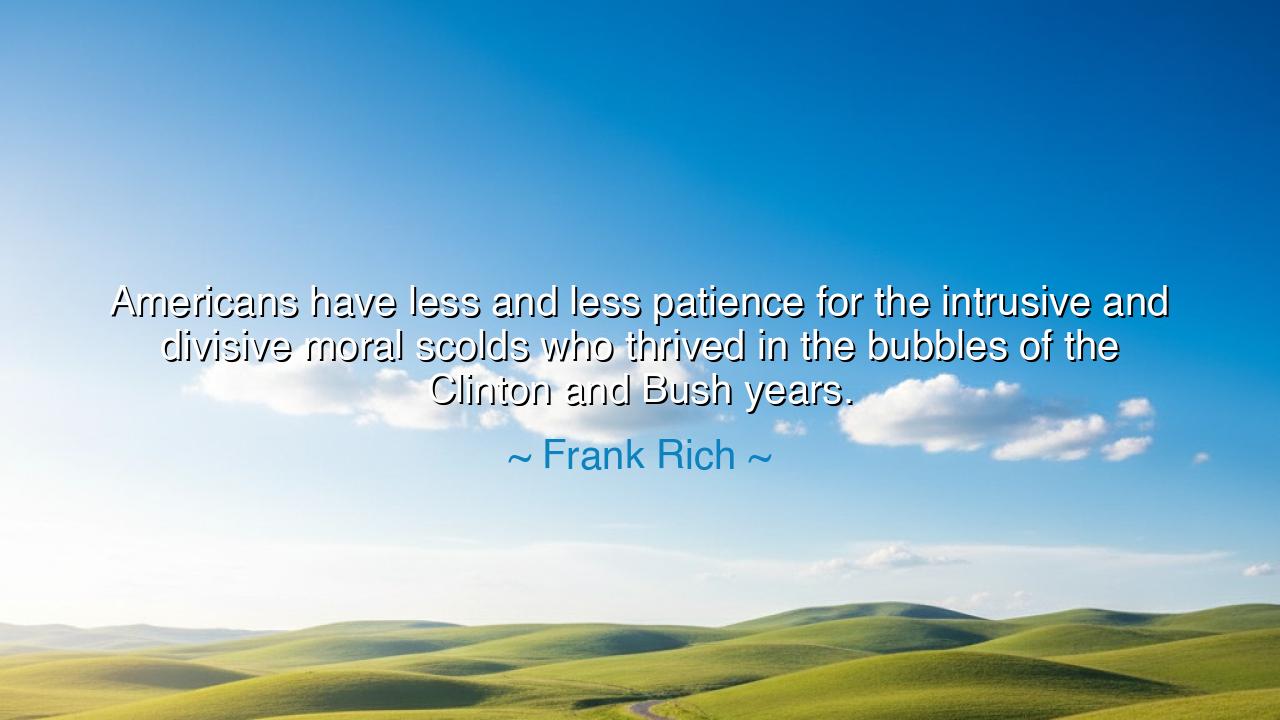
Americans have less and less patience for the intrusive and
Americans have less and less patience for the intrusive and divisive moral scolds who thrived in the bubbles of the Clinton and Bush years.






Hear now the words of Frank Rich, who spoke with sharpness and vision: “Americans have less and less patience for the intrusive and divisive moral scolds who thrived in the bubbles of the Clinton and Bush years.” These are not words of passing observation, but words that reveal the shifting tides of a nation’s spirit. For every age has its rulers not only in politics, but in voice—the voices that seek to define morality, to chastise, to divide. Yet, as Rich observed, there comes a time when the people grow weary of the endless chorus of judgment, and long instead for authenticity, for unity, for freedom from hollow rebukes.
From the earliest days of the republic, Americans were known for their suspicion of authority that sought to bind too tightly. They cast off kings, they broke chains, they crossed frontiers. Yet even within freedom’s embrace, new chains were always forged—chains not of iron, but of rhetoric. In the age of Clinton and Bush, the nation was entangled in culture wars, where moral scolds rose up, claiming to speak for virtue, while often serving division. These voices flourished in their bubbles, their echo chambers of media and politics, but the people beyond began to tire of their constant noise.
Consider, O seekers, the tale of the Puritans of old, who sailed across the ocean seeking liberty, yet soon raised their own harsh codes, where neighbors judged neighbors, and dissent was branded as sin. For a time, such scolding held sway, binding men and women in fear of censure. Yet in time the spirit of freedom broke loose, for no people can forever endure the reign of constant rebuke. History shows again and again that societies weary of those who divide with morality wielded as a weapon.
So too in modern times: in the Clinton era, when scandal consumed the airwaves, voices multiplied, hurling accusations and judgments like stones. In the Bush years, questions of war and values ignited new fires, and once again the moral scolds thrived, gaining power by setting brother against brother, neighbor against neighbor. Yet the people, weary of division, began to turn away. Rich’s words capture that weariness—a recognition that the spirit of a people seeks not endless quarrels, but a deeper unity, a vision beyond scolding.
The lesson is clear: when morality becomes a tool of division rather than a guide to justice, it loses its power. True morality does not shout from bubbles of privilege or partisanship—it walks humbly, it builds bridges, it unites. A society that grows tired of false scolds must seek true voices, those who speak not to shame, but to uplift, not to divide, but to heal. Thus the decline of the scold is also the awakening of a people longing for sincerity.
Look then to the example of Abraham Lincoln. In the time of the nation’s greatest divide, he did not rise as a scold, though he could have condemned with fire. Instead, he called for “malice toward none, charity for all.” His moral authority came not from rebuke, but from compassion. His voice carried power not because it shamed, but because it invited healing. In his example lies the antidote to the fatigue Rich describes.
Therefore, O listeners, take this teaching to heart: do not become a moral scold, loud and divisive, seeking to dominate with words of condemnation. Instead, become a voice of balance and wisdom. In your dealings—whether in family, in work, or in the public square—speak not to wound but to mend. Use your voice to uncover truth, but let it always be tempered with compassion. For in this way you will not weary others with rebuke, but will inspire them with the light of your example.
And so, as Frank Rich has observed, the age of the moral scolds fades. But what rises in its place depends on you. If you choose judgment, you will build walls; if you choose compassion, you will build bridges. The people have grown weary of scolding—let them now be renewed by wisdom. In this, you will help heal the divides of your time and pass on to future generations not a legacy of shouting, but a legacy of understanding.






AAdministratorAdministrator
Welcome, honored guests. Please leave a comment, we will respond soon